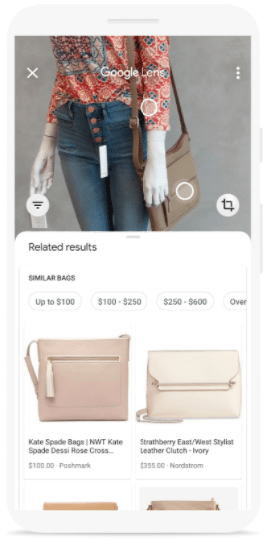Artificial Intelligence is continuously disrupting the world we live in. AI in business is being used across various industries such as healthcare, e-commerce, finance, and many more. AI features include technologies such as Machine Learning, Natural Language Processing, and Computer Vision. AI can be also a game-changing technology for mobile app development.
If you’re looking for the most interesting AI features that you can implement in your mobile app, then search no more! We’ve gathered some examples sorted by the functions they offer to help you sift through them easily.
Product recommendations
AI-fueled product recommendations can be used in all kinds of apps, including, among others, ecommerce and streaming ones. Machine Learning models correlate gathered information and make predictions based on it. A system can start recommending items once it’s been trained on customer preferences and the offered products. Such recommendations can appear, for example, in ads or within mobile apps, thus making it an effective method for promotion and upselling.
One of the most popular examples is Netflix, which suggests movies and shows based on what other users with similar interests have watched. In fact, 75% of videos watched are a result of recommendations. Thanks to such mechanisms, users become engaged with the content and often renew their subscriptions.
Another great example is Empik Go, the largest base of audiobooks and ebooks in Poland, which is accessible via mobile devices in an easy subscription model. Users can see personalised recommendations of audiobooks and ebooks based on the history of their activity in the app.
When it comes to the fashion industry, AI features can enhance product recommendation according to preferences such as colours, shapes or styles.
Customer segmentation
Customer segmentation consists of dividing customers into groups based on mutual characteristics. Thus, companies can market to a precise target group and run personalised campaigns. AI-powered segmentation enables automatic updating of segments and scaling of these processes. Thanks to AI algorithms, a system can analyse data without any presumptions, and is able to spot correlations that humans could overlook. This way, businesses can find hidden patterns and segment customers based on the collected information only.
Customer segmentation is mostly used to send suitable emails, run the most accurate ads as possible and present personalised offers. Play24 is a mobile app that generates plans based on customer profiling, which uses information about users to suggest appropriate offers.
Voice assistants and text chatbots
Bots can enhance the user experience in many ways. First of all, AI-fueled assistants and text chatbots can help solve customers’ problems and answer their questions faster than human-agents. Another possibility is to use bots for conversational commerce, which is a term that describes a purchasing process in the form of conversation. Such shopping assistants can ask for consumers’ preferences in order to recommend the most suitable products for them. Conversational commerce can also refer to chatbots in live chats or all kinds of messaging apps. Some brands increase engagement and trust by using chatbot personalities, which can be revealed in the bot’s name, avatar and a language style that expresses the brand’s voice.
Businesses can take advantage of voice assistants provided by Google, Amazon or Apple. Thanks to integration with Google Assistant, Siri and Alexa, users can interact with these apps to shop online, get customer support, order food, book flights, and use other services.
For instance, PZU, the largest insurance group in the CEE region, provides an Insurance Assistant that supports the mobile purchase of travel policies. Customers can interact with a conversational interface to find tailored offers quickly thanks to Natural Language Understanding, which is built on Google Dialogflow.
Another outstanding example of the use of chatbots in mobile apps is Timesheets. This is a time-tracking solution integrated with Google Assistant, Alexa and Siri, as well as Slack and Google Chat, to provide an excellent conversational experience. Users can log time spent on their tasks faster and easier, and therefore, boost workflow.
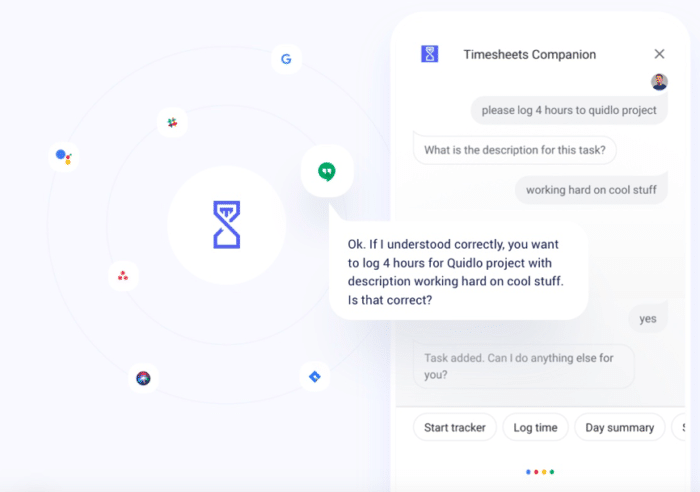
Image recognition
One of the most popular use cases of computer vision is image recognition. This is the process by which an AI algorithm identifies an object in a digital image. This technology can enhance many features like visual search options, for instance. Some online stores, such as BooHoo, allow customers to find their desired items faster thanks to visual searches. Consumers can upload a picture in order to receive similar products back as a result. Image recognition can be widely applied in mobile apps.
For example, Planter uses advanced object recognition to identify species of plants and then advise users on how to take care of them properly. This Flutter mobile app’s classification model is based on a convolutional neural network and is trained via transfer learning. In addition, the classification is run solely on the user’s device, which improves the app’s performance. This is how AI features can identify objects based on photographs and, in this case, guide the user about watering instructions and the required types of soil or fertiliser.
Google uses image recognition for several purposes. For instance, Google Lens technology enables detecting objects that a user is pointing their camera at. Google Assistant can answer what is the particular object and provide users with the appropriate information, suggestions and translation.
Google Maps provides Live View that guides users precisely thanks to image recognition and Augmented Reality. Instead of following the 2D map, users can get directions placed in the real world.
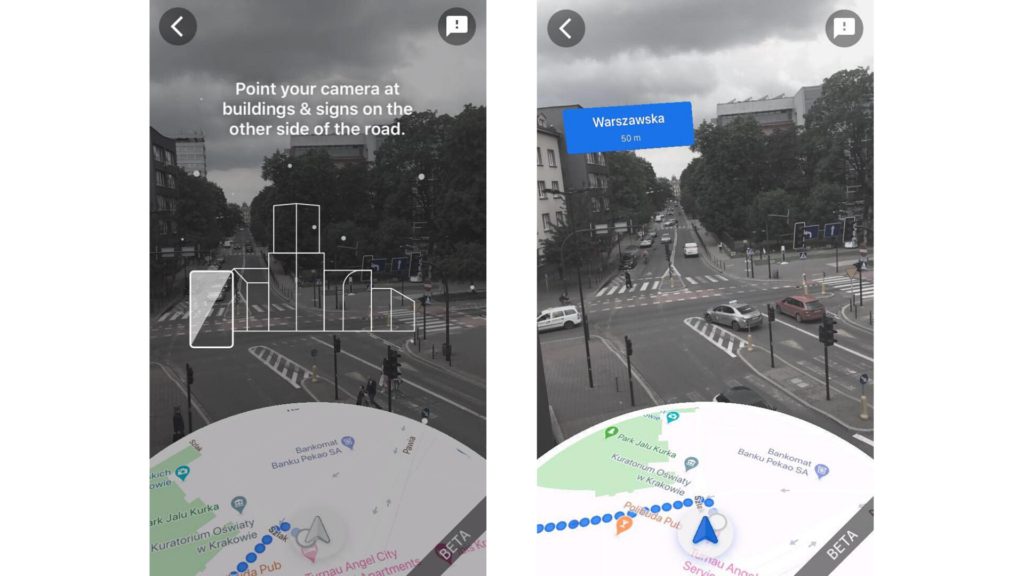
Face detection
Facial recognition is an AI-based biometric feature that allows for the identification and verification of a person from a digital image or video by analysing unique features, such as facial textures and shapes. This technology can be applied in various mobile apps.
Facial recognition is helpful for increasing the security of apps. For example, the BNP Paribas bank includes a know your customer (KYC) mechanism to authorise access in their GOmobile app. This way, customers can open an account without the need to visit a branch of the bank in person. GOmobile compares ID with a video record of the person’s face.
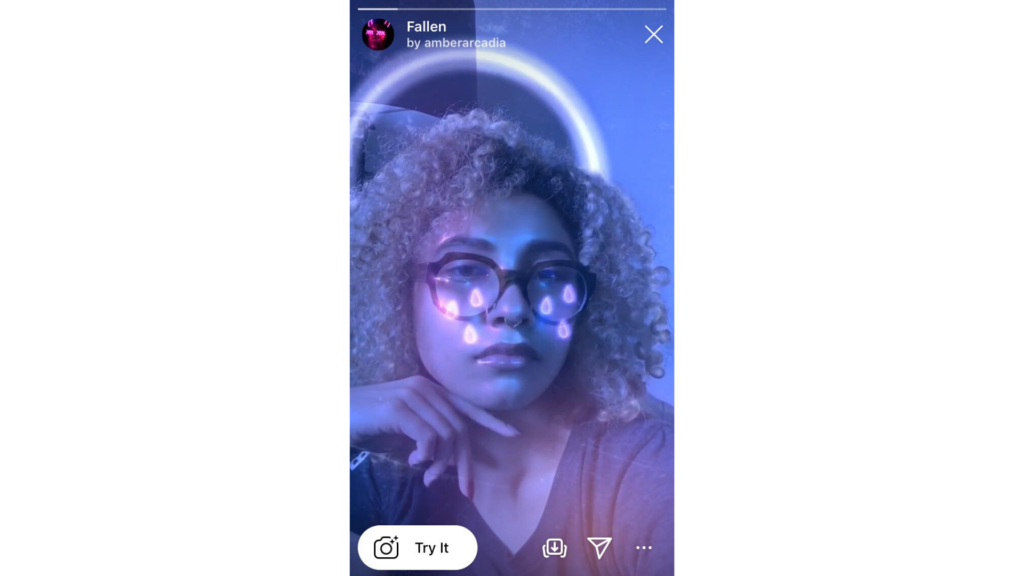
When it comes to face detection, some of the most popular apps that take advantage of it are Facebook and Instagram. These social networks provide filters that help to engage the community when publishing stories. Face detection and augmented reality enable users to add effects to their stories. Spark AR, which is software delivered by Facebook to creators, can identify three different expressions (kissing, smiling and surprised) and can also track a person’s hand. The algorithms run directly on smartphones to speed up the process, as filters run on each frame of video (30 per second).
Credit scoring
AI-based credit scoring solutions apply predictive analytics. The challenge is to predict the probability that a person will repay a loan that they have applied for. Such software analyses the available information on the Internet about the customer, for example from other banks and insurance companies, as well as their online behaviour, including even social media activities. This enables banks to make an informed decision whether or not to grant a loan to a specific customer.
Nextbank uses AI-powered and cloud-based credit scoring to process hundreds of data points from several sources. Machine Learning algorithms analyse the information about credit history, account operations, demographics, loan parameters and more. An automated scoring engine can precisely identify high-risk loans, as well as saving time and money on analysing the data manually.
Autosuggestions and autocorrections
These features might be necessary nowadays in many mobile apps. As technology is embraced in our lives, AI comes in handy to speed up various processes, such as typing.
Google Search takes advantage of an autocomplete AI features to suggest the most probable phrases, so that users can find their desired content faster. It’s especially important for mobile experiences, since typing on small screens can be challenging. Google prefers to call its autocomplete phrases ‘predictions’, rather than ‘suggestions’. This is because the system is designed to help users get what they’d type themselves.
Another example is SwiftKey, which is an intuitive keyboard that learns from the user and suggests appropriate words. Users can switch between different languages and still get adequate corrections.
Text generation
AI-based text generators can replace human writers for creating poems, articles, and other kinds of texts. Actually, the idea is similar to the autocomplete mentioned above. Neural text generators require a vast amount of data to analyse in order to predict the most human-like suggestions.
For example, TalkToTransformer.com uses machine learning based on 8 million websites to compare its guesses with the actual text. The outcome is grammatically correct and coherent in terms of topics.
AI Dungeon, a limitless text adventure game, is an extraordinary example of neural text generation. AI Dungeon uses a massive deep neural network to deliver an engaging experience. Players decide themselves what to do next instead of choosing from options given by the developers.
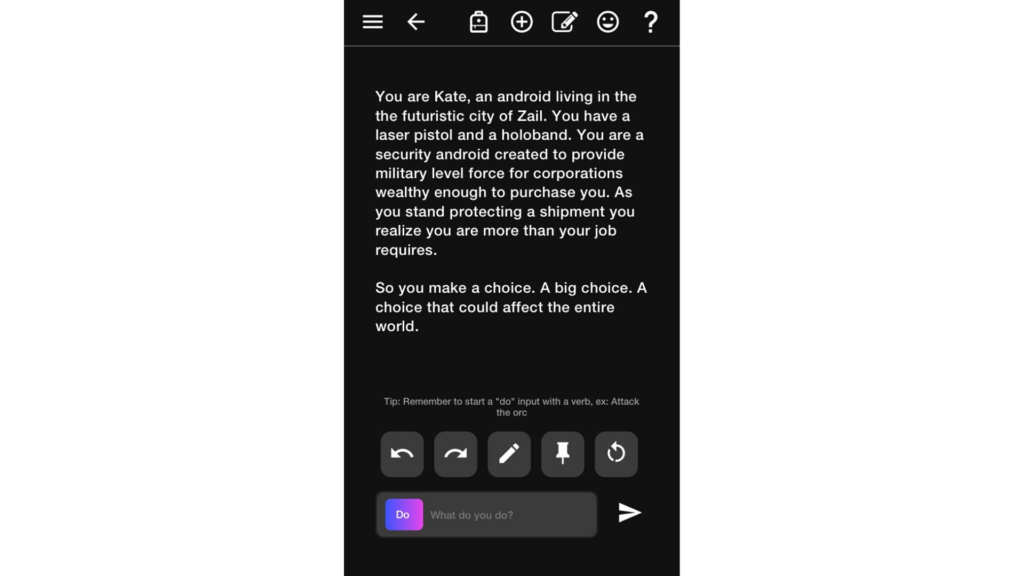
Need a custom AI-based solution?
Actually, we could go on and on with this list of the most interesting AI features. Maybe instead we could talk about your business needs and empower your mobile app with a prominent solution?
Don’t hesitate to drop us a note at hello@miquido.com!



